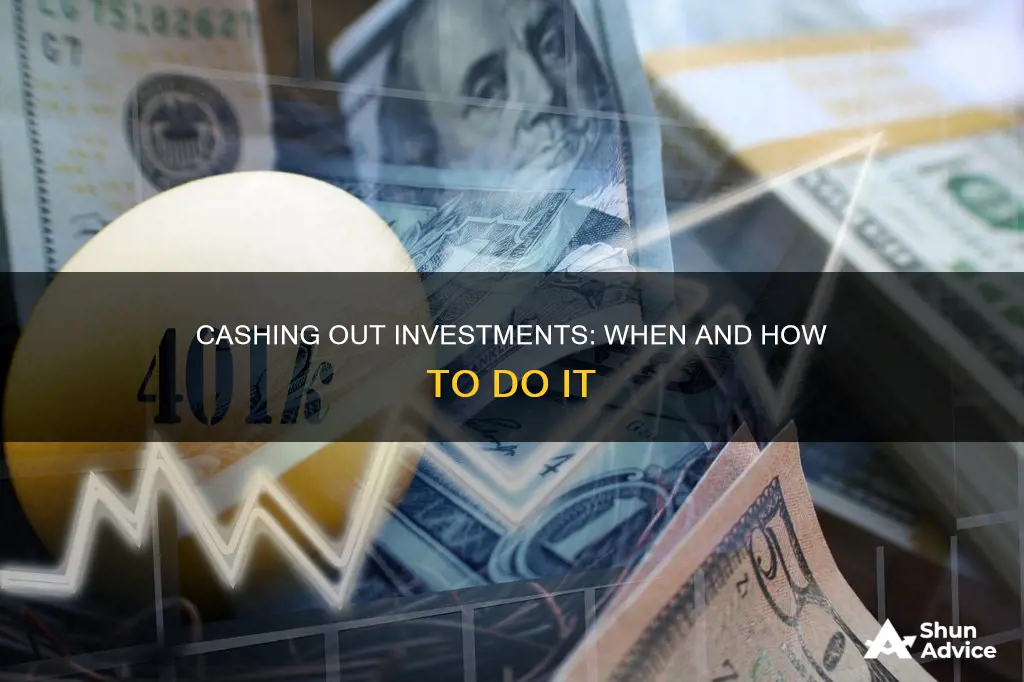
Deciding whether to cash out your investments is a complex decision that depends on a variety of factors, including your age, financial goals, risk tolerance, and market conditions. While there is no one-size-fits-all answer, there are several important considerations to keep in mind when contemplating cashing out your investments.
| Characteristics | Values |
|---|---|
| Timeframe | Investments should be for the long term, ideally 5+ years |
| Risk | Cash is low-risk but can be eroded by inflation; investments can fall and rise in value |
| Age | If you're close to retirement age, you can sell investments to live off of; if you're younger, only sell for emergencies, underperformance, or if you've achieved a goal |
| Company changes | If the company is being acquired, or if its market share is falling, sales growth has slowed, or management has changed, consider selling |
| Cash availability | Keep at least 6 months' income in cash for emergencies; drip-feed cash into investments to reduce risk |
| Opportunity cost | Holding cash means missing out on potential gains in the stock market |
| Rebalancing | Periodically rebalance your portfolio to address immediate cash needs or to address over-representation of a particular stock |
What You'll Learn

Weigh up the opportunity cost
Weighing up the opportunity cost is a crucial part of deciding whether to cash out your investments. Opportunity cost refers to the potential benefits that are missed out on when one alternative is chosen over another. In the context of investments, it is the amount of money you might not earn by cashing out your investments instead of keeping them in the market.
The opportunity cost of cashing out your investments is that you may miss out on the potential for higher returns in the market. By cashing out, you are locking in any losses and forgoing the chance for your investments to recover and grow in value over time. The stock market has historically been the better bet for long-term growth compared to holding cash, as cash does not grow in value and is eroded by inflation over time. Therefore, the opportunity cost of cashing out your investments is the potential for higher returns that you would be giving up.
Additionally, the opportunity cost of cashing out your investments also depends on what you plan to do with the money. If you are considering using the money for a down payment on a home, for example, you need to factor in the cost of capital gains tax, which will reduce the overall amount available for your purchase. You should also consider your investment time horizon, which is the length of time you can keep your money invested without needing to withdraw it for major expenses. If your investment horizon aligns with your financial goals and you can minimise risk as the goal approaches, then cashing out may be a strategic move.
It is important to remember that investing is typically a long-term endeavour, and short-term market volatility should not be the sole reason for cashing out. The decision to cash out your investments should be based on a comprehensive evaluation of your financial goals, risk tolerance, and investment time horizon. Consulting a financial advisor can help you weigh the opportunity costs and make a decision that aligns with your individual circumstances.
Cash Investments: Revenue or Not?
You may want to see also

Consider your age
When deciding whether to cash out your investments, one of the most important factors to consider is your age. This is because your age dictates your risk tolerance and investment timeline, which are crucial in determining your investment strategy. Here are some key considerations:
Risk Tolerance
Your age is inversely proportional to the amount of risk you can take on in your investments. Generally, younger investors can tolerate more risk, while older investors need to be more conservative. This is because younger people have more time to recover from potential losses, whereas older individuals nearing retirement cannot afford significant losses that could impact their retirement funds. As a result, older investors should consider reducing their exposure to volatile assets and shifting towards more stable investments.
Investment Timeline
Your age also determines your investment timeline, which is the amount of time you have until you need to start using your investments, such as during retirement. A longer timeline allows for more aggressive investments and potential recovery from market downturns. On the other hand, a shorter timeline may require a more conservative approach to ensure the preservation of capital.
Life Stage and Goals
Different life stages come with varying financial goals and abilities to take on risk. For example, in your 20s, you may be starting your career and have more flexibility to invest aggressively. In your 30s and 40s, you may be focused on building a family and purchasing a home, which could impact your risk tolerance and investment strategy. As you approach retirement in your 50s and 60s, your goal may shift towards preserving your wealth and ensuring a stable income.
Longevity and Retirement Plans
With increasing life expectancies, it's important to consider how long your retirement might be. The longer your retirement, the more funds you will need to sustain yourself. This may require adjusting your asset allocation to ensure you don't outlive your savings.
Emergency Funds and Peace of Mind
At any age, it's crucial to have an emergency fund that can cover unexpected expenses. This fund should be easily accessible and held in cash or highly liquid assets. The recommended amount is typically enough to cover at least three to six months' worth of living expenses.
In summary, when considering whether to cash out your investments, your age plays a pivotal role in determining your risk tolerance, investment timeline, and overall financial goals. It's important to periodically review and adjust your investment strategy as you progress through different life stages to ensure alignment with your changing needs and circumstances.
What is Levered Free Cash Flow?
You may want to see also

Assess the wider market
When deciding whether to cash out your investments, it's important to assess the wider market. Here are some key considerations:
Market Volatility
Market volatility is a normal occurrence, and it's important to remember that the stock market tends to recover from downturns and bear markets. Historically, the market has rewarded investors who maintain their positions and stay invested for the long term. Therefore, instead of cashing out, consider rebalancing your portfolio to correspond with market conditions and your risk tolerance.
Inflation and Purchasing Power
Inflation erodes the purchasing power of cash over time. While holding cash may provide a sense of security, especially during troubled times, it does not grow in value. In contrast, investing in the stock market offers the potential for long-term growth, outpacing inflation and increasing your purchasing power.
Opportunity Cost
By cashing out your investments, you need to consider the opportunity cost, which is the potential gains you may be missing out on by not remaining invested in the market. Historically, the stock market has outperformed cash holdings over the long term. Therefore, by moving to cash, you may be sacrificing the potential for higher returns.
Timing the Market
Attempting to time the market by selling after a downturn and buying before a rally is extremely difficult, even for professional investors. Rallies can be sudden and unexpected, and individual investors often hesitate to get back into the market, missing out on the best market days. Therefore, rather than trying to time the market, focus on maintaining a long-term investing strategy.
Diversification and Asset Allocation
Diversifying your portfolio across different asset classes, such as stocks, bonds, and alternative investments, can help protect against significant losses. Historically, the returns of stocks, bonds, and cash have not moved in the same direction. By investing in multiple asset classes, you can reduce the risk of losing money and smooth out the overall investment returns of your portfolio. Regular portfolio rebalancing can also help ensure your portfolio remains aligned with your risk tolerance and investment goals.
Unlocking the Power of Idle Cash: Smart Investment Strategies
You may want to see also

Think about your original investment thesis
When deciding whether to cash out your investments, it is important to think about your original investment thesis. This is the reason why you bought a stock in the first place, and it should be something more specific than just wanting to make money. For example, perhaps you invested in a particular company because of its strong market share or its promising sales growth. Over time, the factors that led you to invest in the company may change, and this can be a good reason to sell.
- The company's market share is falling, perhaps due to a competitor offering a superior product at a lower price.
- Sales growth has noticeably slowed.
- The company's management team has changed, or managers are making reckless decisions such as taking on too much debt.
- The company is being acquired by another company.
It is important to remember that this list is not exhaustive. Any substantial change that goes against your original investment thesis could be a valid reason to sell your investment. However, it is also important to carefully consider the context of any changes and avoid making impulsive decisions. For example, before selling a stock that appears to be underperforming, take a close look at the wider industry. If other similar companies are also struggling, it may indicate that the issue is not specific to your investment but rather a broader industry trend.
In addition, it is worth noting that investing is typically a long-term strategy, usually spanning at least five years or more. As such, it is generally recommended to avoid making investment decisions based on short-term fluctuations in the market. Doing so could cause you to miss out on potential gains if the market recovers, as it often does. Therefore, unless there has been a significant change that contradicts your original investment thesis, it may be wiser to hold on to your investments and ride out any temporary downturns.
Cashing Out Putnam Investments: A Step-by-Step Guide
You may want to see also

Plan for emergencies
Financial advisers often recommend keeping at least six months' worth of income in a savings account to cover any unexpected costs. This emergency fund should be readily accessible, allowing you to withdraw money quickly in the event of an emergency. The exact amount you set aside may vary depending on your personal circumstances.
It is important to keep in mind that cash holdings do not generate returns and are susceptible to inflation, which can erode their purchasing power over time. Therefore, it is advisable to invest your money in the stock market or other investment opportunities to grow your wealth and protect it from the effects of inflation. However, investing in the stock market comes with its own set of risks, and the value of your investments can fluctuate.
When faced with an emergency, you may need to decide whether to withdraw from your investments or use your savings. Here are some factors to consider:
- Investment Timeframe: If you anticipate needing the money within the next five years, it is generally advisable to keep those funds in a savings account rather than investing them. This is because investments are intended for the long term, and withdrawing early may result in losses.
- Investment Performance: If your investments are consistently underperforming, it may be wise to cut your losses and withdraw your money. However, it is essential to evaluate the wider industry trends and the performance of similar stocks before making a decision.
- Opportunity Cost: If you identify more lucrative investment opportunities that better align with your financial goals, it may be beneficial to withdraw your money from current investments and allocate it elsewhere.
- Emergency Needs: In the event of an emergency, such as unexpected medical bills or other financial crises, you may have no choice but to withdraw from your investments if your savings are insufficient.
Remember, investing should be approached with a long-term mindset, and short-term fluctuations should not be the sole basis for your decisions. It is always recommended to seek independent financial advice to ensure that your investment strategies align with your risk tolerance, financial objectives, and personal circumstances.
Investing Wisely: Understanding Cash Flow & Depreciation
You may want to see also
Frequently asked questions
Yes, if you need the money for an emergency, it is a good idea to cash out your investments. This is one of the few universally agreed-upon reasons to sell your investments.
If you're approaching retirement age, it is generally a good idea to cash out your investments to live off during your retirement. However, it is important to plan how much money you will need and when you will need it.
It depends. If you believe the market will recover, it may be better to hold onto your investments. However, if you have identified a better investment opportunity, it may be worth selling your current investments to free up capital.







